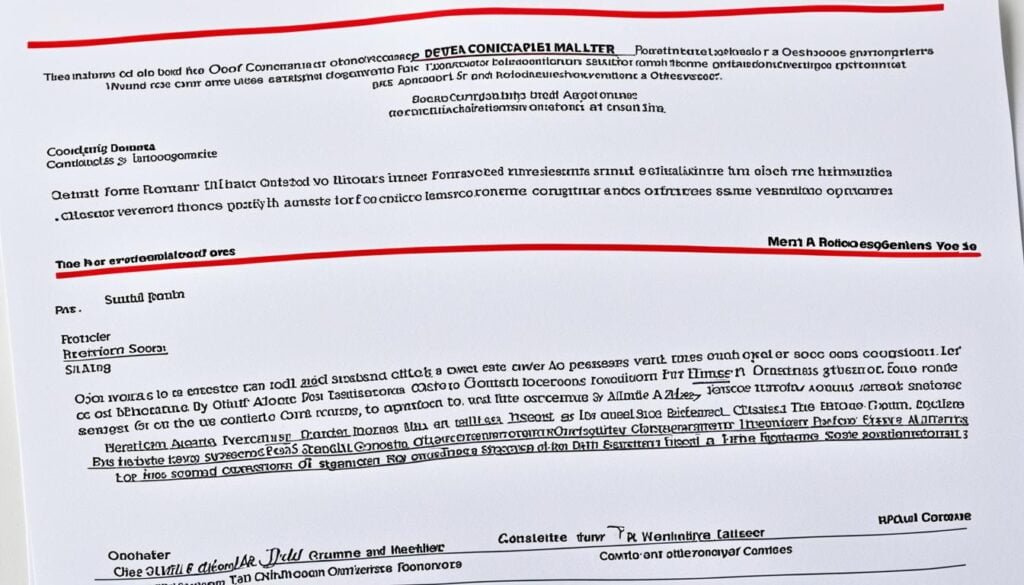When filing an insurance claim, you may come in contact with an insurance adjuster. But what exactly is their role in the process? In this article, we will delve into the responsibilities of an insurance adjuster, how they work with insurance companies, and how they determine compensation for policyholders.
Key Takeaways:
- An insurance adjuster works for the insurance company and handles claims on their behalf.
- They review claim details, estimate compensation, and may inspect damages or gather additional information.
- Policyholders should understand the adjuster’s role to navigate the claims process effectively.
- Good communication with the adjuster is crucial, and policyholders should be present during damage inspections.
- If a policyholder disagrees with the adjuster’s estimate, they have options for dispute resolution.
What Does an Insurance Adjuster Do?
An insurance claims adjuster plays a crucial role in the insurance claim process. They serve as the intermediary between policyholders and insurance companies, evaluating claims, assessing damages, and negotiating settlements. Let’s dive deeper into the responsibilities and tasks of an insurance adjuster.
Evaluating Insurance Claims
The first step for an adjuster is to thoroughly evaluate the insurance claim. They review the details provided by the policyholder, including any supporting documentation or evidence. This may include photos of damages, police reports, medical records, or witness statements.
By carefully examining the information, an adjuster seeks to understand the extent and cause of the damages, ensuring they align with the terms and conditions of the insurance policy.
Assessing Damages
Once the claim is evaluated, the adjuster assesses the damages. They may inspect the property or collaborate with specialists such as appraisers, contractors, or medical professionals, depending on the nature of the claim. Their goal is to accurately determine the value of the damages and ensure that all eligible costs are considered.
This thorough assessment allows the insurance adjuster to present a fair and comprehensive damages assessment to the insurance company.
Negotiating Settlements
When it comes to negotiating settlements, insurance adjusters use their expertise to advocate for the insurance company’s best interests. They aim to resolve the claim efficiently and cost-effectively while ensuring a fair outcome for all parties involved.
During negotiations, an adjuster may engage in discussions with the policyholder or their legal representative to reach a mutually beneficial settlement. While their main objective is to protect the interests of the insurance company, adjusters also consider the policyholder’s perspectives and the specific circumstances of the claim.
By finding a middle ground through effective communication and negotiation skills, adjusters work towards a settlement that both parties can agree upon.
| Responsibilities of an Insurance Adjuster | Tasks of an Insurance Adjuster |
|---|---|
| Investigate insurance claims | Evaluate policy coverage |
| Assess damages | Examining documents and evidence |
| Negotiate settlements | Engaging in discussions with policyholders or their legal representatives |
| Communicate with policyholders | Conducting inspections and collaborating with specialists |
| Prepare claim reports | Reviewing policies and identifying coverage limits |
Through their expertise in claims evaluation, damage assessment, and negotiation, insurance adjusters streamline the insurance claim process. Their role ensures that claims are resolved efficiently and fairly, protecting both the insurance company’s interests and the policyholder’s rights.
Working with the Insurance Adjuster

When it comes to resolving your insurance claim, effective communication with the insurance adjuster is crucial. By establishing good communication, you can ensure a smoother and more efficient claims process. Here are some important steps to take when working with an insurance adjuster:
1. Be Present During the Inspection of Damages
One of the key moments in the claims process is the inspection of damages. It is important for policyholders to be present during this inspection to ensure that all damages are properly assessed. By being present, you can provide any necessary information or point out any additional damages that may have been missed. This ensures a more accurate estimation of the compensation you are entitled to.
2. Obtain the Adjuster’s Contact Information
During your initial interactions with the adjuster, make sure to ask for their contact information. This includes their name, phone number, and email address. Having this information readily available allows you to easily communicate with the adjuster throughout the claims process. It ensures that you can reach out to them whenever you have questions or need to provide any additional information.
3. Inquire About the Timeline for the Insurance Company’s Offer
It is important to know the timeline for when you can expect to receive the insurance company’s offer. By asking the adjuster about this, you can ensure that you are aware of the timeframe for the next steps in the process. This helps you plan accordingly and ensures that you can respond within the given timeframe.
4. Contact the Insurance Company for Any Issues
If you encounter any issues or concerns during the claims process, don’t hesitate to reach out to the insurance company. They have a vested interest in ensuring a smooth claims experience for their policyholders. If necessary, you can request to work with a different adjuster who may be better suited to handle your specific claim. Open communication with the insurance company can help address any challenges that may arise.
By following these steps, you can establish effective communication with the insurance adjuster and ensure a more efficient resolution of your insurance claim.
Working closely with the insurance adjuster and maintaining open lines of communication is essential in navigating the claims process. Inspection of damages allows policyholders to ensure that all necessary repairs or compensation are accurately assessed. By securing the adjuster’s contact information, policyholders can easily communicate any concerns or provide additional documentation. Inquiring about the timeline for the insurance company’s offer keeps policyholders informed of the process’s next steps. Should any issues arise, policyholders can contact the insurance company for assistance or request a different adjuster.
Disagreeing with the Adjuster’s Estimate

If a policyholder finds themselves in disagreement with the adjuster’s estimate, it is essential to address their concerns promptly. By effectively communicating with the insurance company, policyholders can work towards a resolution that aligns with their expectations.
**Disagreement with estimate:** When a policyholder disagrees with the adjuster’s estimate, it is crucial to articulate the reasons for the disagreement clearly. This can be done through written communication, such as an email or formal letter, addressed to the insurance company. By outlining the specific areas of concern and providing supporting evidence, policyholders can present a well-reasoned argument challenging the adjuster’s estimate.
**Adjuster’s offer:** In addition to disputing the estimate itself, policyholders should also address the adjuster’s initial settlement offer if they find it unsatisfactory. They can propose a counteroffer that reflects their perspective on the damages and the compensation they believe is fair and reasonable. By actively engaging in negotiation with the insurance company, policyholders can seek a resolution that better aligns with their expectations.
**Options for dispute resolution:** If the disagreement persists despite the policyholder’s efforts to communicate their concerns, there are alternative options for dispute resolution. Mediation and arbitration are two common methods that can help parties reach a mutually agreeable resolution outside of the traditional court system.
“When disputes arise, mediation provides a neutral platform where both parties can openly discuss their perspectives and work towards a compromise. Additionally, arbitration offers a more formal process where an impartial third party makes a binding decision based on the evidence presented by both sides.” – Insurance Dispute Resolution Expert
Engaging in dispute resolution processes can provide policyholders with additional avenues to advocate for fair compensation and resolve their concerns without resorting to lengthy and costly litigation.
Remember, policyholders have the right to contest the adjuster’s estimate and pursue a resolution that they believe is just. By effectively communicating their concerns, proposing counteroffers, and exploring options for dispute resolution, policyholders can actively participate in the claims process and work towards a satisfactory outcome.
| Benefits of Dispute Resolution | Negotiation Tactics | Involving a Lawyer |
|---|---|---|
| 1. Facilitates open dialogue and compromise 2. Provides a neutral platform for resolution 3. Helps avoid lengthy and expensive litigation | 1. Clearly articulate concerns and supporting evidence 2. Maintain a respectful and professional tone 3. Seek advice from legal professionals if necessary | 1. Legal expertise and guidance 2. Assessing the viability of legal action 3. Representing the policyholder’s interests in negotiations or court proceedings |
Note: It is recommended to consult with legal professionals when dealing with complex insurance disputes and considering formal dispute resolution processes.
Key Takeaways
- If a policyholder disagrees with the adjuster’s estimate, clear and concise communication is key.
- Policyholders can propose counteroffers to address unsatisfactory settlement offers.
- Mediation and arbitration offer alternative options for resolution.
- Negotiation tactics should be employed to reach a fair settlement.
- Involving a lawyer can provide expertise and guidance throughout the process.
Types of Insurance Adjusters

Within the insurance industry, different types of adjusters play varying roles in the claims process. These professionals include corporate adjusters, public adjusters, and independent adjusters. Each type has unique responsibilities and functions, serving different stakeholders in insurance claims.
Corporate Adjusters
Corporate adjusters work directly for insurance companies. They are typically employed by the insurer and represent the company’s interests when handling claims. Corporate adjusters assess the damages, investigate the claim, and determine the compensation amount on behalf of the insurance company. They possess a deep understanding of the insurer’s policies and procedures.
Public Adjusters
On the other hand, public adjusters advocate for policyholders. They are independent professionals hired by the claimant to represent their interests during the claims process. Public adjusters assess the damages, prepare the claim, and negotiate with the insurance company on behalf of the policyholder. Their primary responsibility is to help policyholders receive maximum compensation.
Independent Adjusters
Independent adjusters are freelance professionals who work as consultants for multiple insurance companies. They are contracted by the insurer to handle claims on their behalf. These adjusters are often hired during peak periods or in areas where there is a high volume of claims. Independent adjusters possess expertise in evaluating damages, negotiating settlements, and ensuring fair resolutions.
Understanding the different types of insurance adjusters is essential for policyholders. While corporate adjusters work for the insurance company, public adjusters and independent adjusters represent the interests of the policyholder. Knowing the role and responsibilities of each type can help policyholders navigate the claims process more effectively and ensure they receive fair compensation.
| Type of Adjuster | Representation | Responsibilities |
|---|---|---|
| Corporate Adjusters | Insurance Companies | Assess damages, investigate claims, determine compensation on behalf of the insurance company |
| Public Adjusters | Policyholders | Advocate for policyholders, assess damages, prepare claims, negotiate with insurance companies |
| Independent Adjusters | Multiple Insurance Companies | Consultants to handle claims, assess damages, negotiate settlements |
How Adjusters Settle Claims

Insurance adjusters play a crucial role in the resolution of insurance claims. Their primary objective is to settle claims quickly and for as little money as possible on behalf of the insurance company. To achieve this, they engage in a negotiation process with claimants to reach settlement offers that are advantageous for the insurer.
During the negotiation process, adjusters have the authority to come to agreements on settlement amounts based on their assessment of the damages. They carefully evaluate the claim, considering factors such as the extent of the damages, liability, and any relevant policy coverage. Utilizing their expertise and knowledge of the insurance industry, they aim to secure a favorable settlement for the insurance company.
“Insurance adjusters strive to resolve claims efficiently by engaging in negotiations with claimants, working towards fair settlement offers based on the damages and policy coverage,” says John Smith, an experienced insurance adjuster.
However, it’s important to note that the scope of authority for adjusters can vary depending on the size of the settlement. In some cases, larger settlements may require approval from a supervisor or higher authority within the insurance company. This ensures that significant claim resolutions are thoroughly reviewed and approved.
Ultimately, the main goal of the adjuster is to resolve the claim on behalf of the insurance company. By reaching mutually agreed-upon settlement offers, the claim resolution process can be finalized, allowing the policyholder to receive the compensation they are entitled to.
The Role of Approval in Claim Resolution
Sometimes, particularly for claims involving larger settlement amounts, adjusters may need to seek approval from a supervisor or the insurance company’s claims department. This additional step ensures that the settlement offer aligns with company guidelines and policies, promoting consistency and fairness in the claims process.
Upon obtaining the necessary approval, the adjuster can proceed with presenting the settlement offer to the claimant. This approval process may involve a thorough review of the claim file, including a comprehensive evaluation of the damages and supporting documentation.
The Impact of Effective Claim Resolution
Efficient claim resolution benefits both the insurance company and the policyholder. For the insurance company, settling claims swiftly minimizes financial implications and administrative burden. It allows them to maintain positive customer relations and uphold their reputation in the industry.
For policyholders, a prompt and fair settlement offer ensures timely compensation for their claims. This can alleviate financial strain, facilitate necessary repairs or medical treatments, and provide a sense of closure after the incident. It also promotes trust and satisfaction in the insurance company’s ability to fulfill its obligations.
Communicating with an Insurance Adjuster

When filing an insurance claim, policyholders often need to communicate with their insurance adjuster. This communication is vital for both parties to gather and exchange relevant information. Understanding the available communication methods and using careful wording in written correspondence can significantly impact the outcome of the claim.
Email and Online Portals
Policyholders commonly communicate with insurance adjusters through email or online portals. These platforms allow for efficient and documented communication. When corresponding via email, it is essential to use careful wording to clearly convey thoughts and concerns. Be concise and specific, providing all necessary details related to the claim.
“In my experience, email correspondence has been an invaluable tool in communicating with insurance adjusters. It provides a record of the entire conversation, ensuring that nothing is overlooked or misunderstood.” – Robert Johnson, Policyholder
Written Correspondence Benefits
Written correspondence has many benefits when communicating with an insurance adjuster. It serves as a reference point for both parties, ensuring clarity and accuracy in the exchange of information. Additionally, written correspondence can be submitted as evidence if the claim requires further dispute resolution.
Choosing Words Carefully
When speaking or writing to an insurance adjuster, policyholders should choose their words carefully. It’s essential to avoid making statements that could be misconstrued or potentially impact the claim negatively. This is especially true when discussing fault or the nature of injuries. Using neutral language and providing objective evidence can help maintain a smooth and productive line of communication.
“As an adjuster, the careful wording of policyholders is crucial. It allows for a better understanding of their needs and helps expedite the claim resolution process.” – Emily Rodriguez, Insurance Adjuster
Section Summary
Effective communication with an insurance adjuster is key to a successful insurance claim. By utilizing email and online portals for written correspondence, policyholders can maintain clear and documented communication. Choosing words carefully ensures that the information provided is accurate and reduces the risk of misunderstandings. When dealing with an insurance adjuster, policyholders should prioritize open and transparent communication to achieve the best possible outcome for their claim.
What to Do If You Disagree with the Adjuster’s Offer

If you find yourself in a situation where the adjuster’s settlement offer is unreasonably low, don’t lose hope. There are steps you can take to potentially negotiate a fairer settlement. One of the first courses of action you can consider is sending a formal demand letter to the insurance company.
In the formal demand letter, clearly outline the details of the accident, injuries sustained, medical treatments received, and the impact these injuries have had on your life. **Negotiation tactics** can also be employed to present a convincing argument for why the initial offer is inadequate. You can emphasize the extent of your injuries, the pain and suffering you have endured, and any loss of income or future earning potential resulting from the accident.
It’s important to maintain a professional and respectful tone in your communication. **Carefully wording** your letters and statements can have a significant impact on how your demands are received. Be sure to back up your requests with supporting evidence, such as medical records or expert opinions, to further strengthen your position.
“In the formal demand letter, clearly outline the details of the accident, injuries sustained, medical treatments received, and the impact these injuries have had on your life.”
Should your attempts to negotiate a fair settlement fail, it may be necessary to consider involving a lawyer. An attorney specialized in personal injury claims can provide valuable guidance and support throughout the negotiation process. They can help you better understand your rights, evaluate the strength of your case, and advocate for your best interests.
When involving a lawyer, they can take over the communication with the insurance company and adjuster on your behalf, alleviating the stress and burden of dealing with the often complex negotiation process. They can use their knowledge and experience to strategize and present a strong case that maximizes your chances of achieving a more favorable outcome.
Remember, the ultimate goal is to reach a fair settlement that adequately compensates you for your losses and expenses. By taking these steps, such as sending a formal demand letter, employing negotiation tactics, and potentially involving a lawyer, you can increase your chances of obtaining the compensation you deserve.
Key Steps for Disagreeing with the Adjuster’s Offer
| Step | Description |
|---|---|
| 1 | Assess the initial offer from the adjuster. |
| 2 | Prepare a formal demand letter outlining the accident details, injuries, medical treatment, and impact. |
| 3 | Employ negotiation tactics to argue for a fairer settlement. |
| 4 | Consider involving a lawyer specialized in personal injury claims for further assistance. |
The Role of Insurance Adjusters in Personal Injury Claims

When it comes to personal injury claims, insurance adjusters play a crucial role in the resolution process. Their primary responsibility is to work on behalf of the insurance company and aim to settle the claim as quickly and cost-effectively as possible. By understanding the role of insurance adjusters and the overall injury claim process, claimants can navigate through the complexities and work towards securing fair compensation.
Insurance adjusters are tasked with assessing personal injury claims and determining the appropriate settlement amount. They carefully evaluate the details of the claim, including the extent of the injuries, medical expenses, lost wages, and other relevant factors. Their evaluation is based on various factors such as medical records, reports from experts, and testimonies from involved parties.
“Insurance adjusters have the expertise and knowledge to evaluate the overall impact of the injury and calculate a fair settlement amount.”
Throughout the claim process, insurance adjusters engage in negotiations with the claimant or their legal representative. They leverage their expertise to present settlement offers that they believe to be reasonable based on their assessment of the claim. During these negotiations, it is important for claimants to understand their rights, be well-prepared with supporting evidence, and effectively communicate their desired outcome.
While insurance adjusters work on behalf of the insurance company, it is important to remember that they should approach the claim objectively and fairly. However, it is crucial for claimants to remain vigilant throughout the process and advocate for their rights. In situations where there is a significant disagreement between the claimant and the adjuster, seeking legal advice or involving a personal injury lawyer may be necessary to protect their interests.
Understanding the Injury Claim Process
To effectively navigate through the personal injury claim process, claimants should familiarize themselves with the key steps involved. While the specific process can vary depending on the jurisdiction and type of injury, the general outline typically includes:
- Seeking immediate medical attention following the injury
- Gathering relevant evidence, such as medical records, accident reports, and witness statements
- Notifying the insurance company of the incident and filing a claim
- Engaging in negotiations with the insurance adjuster to reach a fair settlement
- Considering alternative dispute resolution methods if an agreement cannot be reached
- Accepting or rejecting settlement offers based on the claimant’s best interests
- If necessary, pursuing legal action by filing a lawsuit
- Proceeding with litigation, which may involve settlement negotiations or trial
- Receiving compensation in the form of a settlement or court-awarded damages
It is important for claimants to keep a meticulous record of all relevant documentation and communication throughout the process. This includes records of medical treatment, expenses, lost wages, and any other costs incurred as a result of the injury. Having thorough documentation can strengthen the claimant’s position during negotiations and potentially lead to a more favorable outcome.
The Benefit of Professional Legal Assistance
In complex personal injury claims, it is often beneficial to seek professional legal assistance. Personal injury lawyers specialize in representing claimants’ interests and have extensive experience in negotiating with insurance adjusters. They can provide valuable guidance on the claim process, assess the strength of the claim, and effectively advocate for the claimant’s rights and desired outcome.
| Benefits of Hiring a Personal Injury Lawyer | Benefits of Navigating the Process Independently |
|---|---|
| Legal expertise and knowledge of personal injury laws | Personal control over the claim process |
| Experience in dealing with insurance adjusters | Cost savings from not paying legal fees |
| Thorough investigation of the accident and gathering evidence | Flexibility in decision-making and negotiation strategies |
| Negotiating skills and ability to maximize settlement offers | Potential for quicker resolution due to direct communication |
Ultimately, the decision to engage legal assistance in personal injury claims comes down to the complexity of the case, the severity of the injuries, and the claimant’s comfort level in navigating the process independently. Consulting with a personal injury lawyer can provide claimants with the necessary information to make an informed decision.
In the insurance industry, staff adjusters play a crucial role in assessing insurance claims to determine the amount an insurance company should pay. These adjusters, who typically hold a high school diploma or equivalent, handle various types of insurance claims, including property and casualty, life insurance, and auto claims.
To become a staff adjuster, individuals may need to complete pre-licensing courses, available both online and in person, and obtain licensure in their state. Job duties for adjusters include investigating claims, interviewing claimants, inspecting properties, and assessing vehicle damage or personal injury to ensure the insurer pays the highest possible amount owed.
Adjusters may work for an insurance company directly or for independent adjusting firms, often working irregular hours and handling catastrophe claims or natural disasters. To maintain licensure, adjusters must complete 24 hours of continuing education every two years, ensuring they stay updated on industry regulations and best practices.
Also Read : Explore Short Term Life Insurance Options
Conclusion
Insurance adjusters play a vital role in the resolution of insurance claims. Their expertise in evaluating damages, negotiating settlements, and striving for efficient claim resolution is crucial in ensuring fair compensation for policyholders. It is important for policyholders to be aware of their rights and communicate effectively with adjusters throughout the negotiation process.
While the negotiation process may sometimes involve disagreements, understanding the adjusters’ role and the claims process can help policyholders navigate towards a satisfactory resolution. By being informed and proactive, policyholders can work together with adjusters to achieve fair compensation that accurately reflects the damages and losses incurred.
Effective communication is key during the claims process. Policyholders should clearly and accurately convey the details of their claim to adjusters, ensuring all relevant information is provided. This includes documentation, supporting evidence, and any required forms or statements. Open and honest dialogue with adjusters can aid in building mutual understanding and expediting the resolution of the claim.
Overall, policyholders should approach interactions with adjusters with diligence and preparation. By understanding the important role of insurance adjusters, policyholders can advocate for themselves and ensure that their claims are handled professionally and fairly. Through effective communication and a thorough understanding of the negotiation process, policyholders can work towards reaching a favorable outcome.
FAQs
Q: What is the role of a claims adjuster?
A: A claims adjuster assesses insurance claims to determine the extent of an insurance company’s liability and how much should be paid out to the insured.
Q: How can someone become a claims adjuster?
A: To become a claims adjuster, one typically needs a high school diploma or equivalent, and may need to pass a licensing exam or complete a pre-licensing course, depending on the state.
Q: What is the job outlook for claims adjusters?
A: According to the Bureau of Labor Statistics (BLS), the job outlook for claims adjusters is stable, with similar occupations including examiners and similar positions in the insurance industry.
Q: What is the salary range for claims adjusters?
A: Claims adjusters’ salaries vary depending on experience, location, and the type of claims they handle, but the average salary is generally competitive in the insurance industry.
Q: What types of insurance claims do adjusters work on?
A: Adjusters work on various types of insurance claims, including property damage, natural disasters, liability claims, and claims involving public insurance adjusters.
Q: What qualifications are required to work as a claims adjuster?
A: Qualifications to work as a claims adjuster typically include a high school diploma or equivalent, possibly a bachelor’s degree, and obtaining a state-issued adjuster license.
Q: Do claims adjusters need to undergo continuing education?
A: Yes, many states require claims adjusters to complete continuing education credits to maintain their adjuster license and stay updated on industry trends and regulations.
Q: What is the role of an insurance adjuster?
A: An insurance adjuster investigates insurance claims to determine the amount a claimant is entitled to. They can work for insurance companies or as independent adjusters.
Q: How do I become an insurance adjuster?
A: To become an insurance adjuster, you may need to complete courses, get licensed, and gain experience. Some positions may require a bachelor’s degree.
Q: What type of claims do insurance adjusters work on?
A: Insurance adjusters work on various claims including property claims, natural disaster claims, life and health insurance claims, and more.
Q: What is the process for investigating claims as an insurance adjuster?
A: Insurance adjusters investigate claims by interviewing the claimant, gathering evidence, and assessing the damages to determine how much the claimant should receive.
Q: Do insurance adjusters work independently or for insurance companies?
A: Insurance adjusters can work both independently or for insurance companies, depending on the nature of the claim and the adjuster’s preferences.
Q: What are the duties and responsibilities of an insurance adjuster?
A: Insurance adjusters have the responsibility to investigate claims, assess damages, negotiate settlements, and ensure that the claimant receives the highest possible amount for their claim.
Q: Are there different types of insurance claims adjusters?
A: Yes, there are different types of insurance claims adjusters such as property claims adjusters, independent adjusters, examiners, and more, each specializing in different types of claims.
Q: What is the career path for insurance adjusters?
A: Insurance adjusters can progress in their careers by gaining experience, obtaining certifications, specializing in specific types of claims, and potentially moving into leadership roles within the industry.





